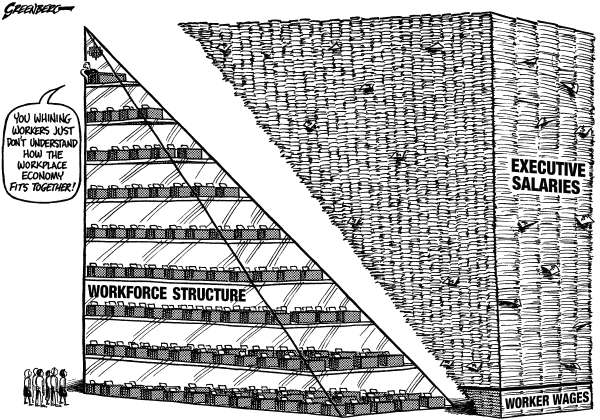Search
Democracy Links
Member's Off-site Blogs
the reward system .....
from Crikey .....
A Crikey cure for outlandish executive pay
Adam Schwab writes:
Submissions continue to pour into the Productivity Commission's review of executive pay, as corporate lobby groups argue for the status quo to remain intact, while Unions seek a cap on high-level remuneration.
So far, it appears that the business lobby is in the box seat, with the review's chairman, Gary Banks, stating that "while (imposing caps on executive pay) may have support within the union movement or wider community, they imply a degree of systemic failure and of faith in prescriptive regulatory remedies that seem difficult to reconcile with what has been learnt thus far." Banks added that, "if shareholders consider that they are not receiving an adequate return because of poor remuneration practices in a particular company, they can sell their shares."
While Banks' comments may be technically correct, it could be reasonably argued that given shareholders are the underlying owners of the assets of a corporation, they should have the right to moderate executive pay before being forced to liquidate their interest in those assets.
One cannot help but be impressed by the audaciousness of the business lobby's submissions. For example, the Financial Review reported this morning that Wesfarmers boss, Richard Goyder, "warned against a one-size fits-all regulation and claimed 'at risk' pay had successfully driven value for shareholders." Goyder's comments are somewhat ironic given the performance of the company he manages.
Goyder became CEO of Wesfarmers in 2005. Since then, Wesfarmers shares have dropped by 42%. The fall was precipitated by Wesfarmers over-priced acquisition of Coles Group (led by Goyder) at the height of the market boom. Despite presiding over the entire debacle, Goyder was paid $5.06 million in 2008, $5.3 million in 2007 and $6.6 million in 2006. As such, perhaps Goyder isn't the best person to be providing advice on driving value for shareholders.
In case the Productivity Commission reads Crikey, here's our cure for the ills of executive pay. Instead of a binding remuneration report or statutory limits on compensation or allowing the status quo to continue, the best way to truly ensure executive pay returns to a reasonable level is to discipline directors (like those at Wesfarmers) who get it wrong. If shareholders reject a company's remuneration report (as was the case last year at Wesfarmers and Boral or the prior year at Telstra), directors who served on the Remuneration Committee and the Chairman of the Board should be required to repay all director's fees received that year.
Currently, directors have no personal liability whatsoever with regards to their actions (in the rare event they are held liable for even a serious a breach of directors' duties, in most cases, their liability would be covered by insurance paid for by the company). The situation is analogous to an employee not accumulating demerit points if they were commit to traffic infringements while driving a company car. In such a case, there is no deterrent prevent the employee from speeding because they know they won't be held accountable for their actions.
One suspects that when company directors face losing several hundred thousand dollars in directors' fees, they may be more willing to listen to what shareholders have to say.
Ultimately, it should be shareholders, not legislations, who should have the final say on executive pay.
- By John Richardson at 5 Jun 2009 - 6:30pm
- John Richardson's blog
- Login or register to post comments

Recent comments
2 hours 33 min ago
5 hours 30 min ago
7 hours 22 min ago
7 hours 43 min ago
10 hours 13 min ago
11 hours 18 min ago
11 hours 30 min ago
13 hours 30 min ago
14 hours 30 min ago
14 hours 59 min ago